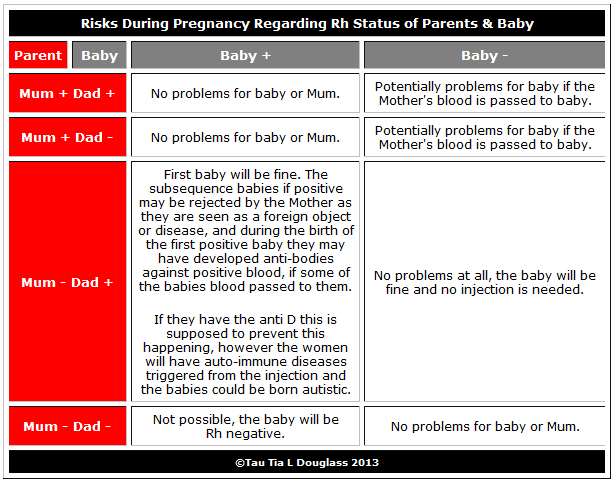
Signs of red blood cell destruction in the baby’s blood are signs of Rh incompatibility.

Diagnosing higher-than-normal levels of bilirubin in the infant’s blood shows Rh incompatibility.This test uses a blood sample to check for antibodies that are attached to the surface of your red blood cells A positive direct Coombs test is an indication of Rh incompatibility.Certain screening tests will help the doctor to determine whether the mother to be is at any risk of Rh incompatibility If the blood type of father is Rh-positive and the mother is Rh-negative, then the baby can have higher chances of being Rh-positive blood type.However, in case the father to be is also Rh-negative blood type, there is nothing to worry about If the expecting mother is Rh-negative, the doctor may ask for father’s blood group.If the mother fails to get a RhoGam shot, she will be at risk of Rh incompatibility in her existing and all subsequent pregnanciesĪ blood test will likely be undertaken during the first prenatal visit to check if the pregnant woman is Rh-positive blood type or Rh-negative blood type. Amniocentesis test and also chorionic villus sampling (CVS) test can expose the pregnant woman to Rh positive blood.Using an injection whose needle had blood which was Rh-positive.Miscarriage or even an abortion that has been induced.If the mother to be has bleeding or abdominal pain during pregnancy.
#A negative blood type pregnancy complications skin
Symptoms of jaundice like yellowish color of the skin and the white part of the eyesīefore pregnancy, if by any chance the mother to be is exposed to Rh positive blood, then she is at a higher risk of Rh incompatibility. Some of the signs that show up in the baby are: Increased amount of bilirubin after birth – hyper-bilirubinemia – can result in an enlarged liver and spleen, severe jaundice, and even can prompt cerebral palsy in some casesĪs explained above, Rh incompatibility affects the unborn baby and some symptoms will be seen in them. Breaking down of RBC can result in the formation of a chemical called bilirubin, which can give rise to jaundice in newborns. Depending on the severity of the hemolytic anemia, it can be lethal as chances of edema and heart failure increases As the result of breaking down of RBC, hemolytic anemia can develop. So if the red blood cells are not sufficient, the baby fails to get enough amount of oxygen. RBC carries the oxygen to different body parts. This means the destruction of red blood cells happens sooner than the body’s ability to replace them. Rh incompatibility will cause hemolytic anemia in the unborn baby. Therefore, Rh incompatibility tends to cause complications in the next pregnancy. The body will make more Rh antibodies in successive pregnancies. The antibiotics stay in the woman’s body. It is due to the fact that the baby is usually delivered before the antibodies in the blood increases. These antibodies, generally, do not create issues if the woman is pregnant for the first time. These antibodies might cross the placenta to attack the baby’s red blood cells. If this happens, the immune system of the mother will develop antibodies against her own unborn baby’s red blood cells. The blood from the baby can get into the mother’s blood stream, any time during pregnancy, labor, or (most probably) during the time of delivery. Once the pregnant woman has Rh-negative blood type and her unborn baby has Rh-positive blood type, then pregnant woman’s body will mistake the Rh-positive protein in the blood of the unborn baby as an outside substance. The majority of the people have Rh-positive type of blood. As in the case of blood group, the Rh factor is also hereditary. Rh+ refers to the presence of Rh factor, while Rh-ive refers to its absence. However, the blood cells of a small percentage of people do not carry Rh factor. All these blood types carry a particular protein known as the Rh factor on the surface of each blood cell. Read on to know about Causes, Symptoms, Diagnosis & Treatment For Rh Incompatibility As both mother and child have different blood types, it will develop an inconsistency or Rh incompatibility. 
Rh incompatibility happens if the pregnant woman is Rh-negative blood type (RBC without Rh factor) and the blood type of her unborn baby is Rh-positive (RBC with Rh factor). It is a medical condition that happens over the course of pregnancy. Who Are At The Risk Of Rh Incompatibility?

Continue reading to get an overall idea about the Causes, Symptoms, Diagnosis & Treatment Of Rh Incompatibility. However, it can have a significant effect on subsequent pregnancies. Rh incompatibility which usually will not create many issues during the first pregnancy. This complication is called Rh incompatibility. The blood group, which never causes any trouble until pregnancy, can develop complications during pregnancy. Once the Rh incompatibility test result turns out to be positive, lots of doubts and worries may arise.







 0 kommentar(er)
0 kommentar(er)
